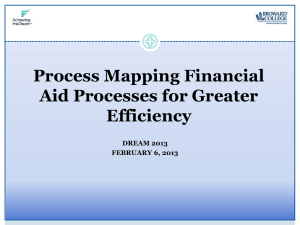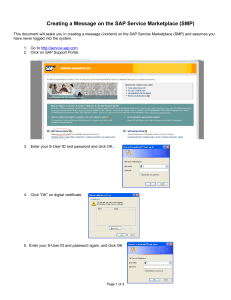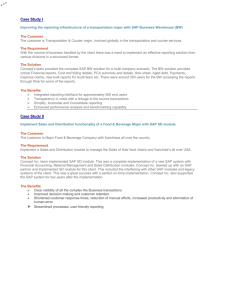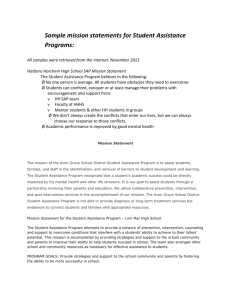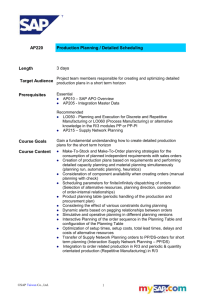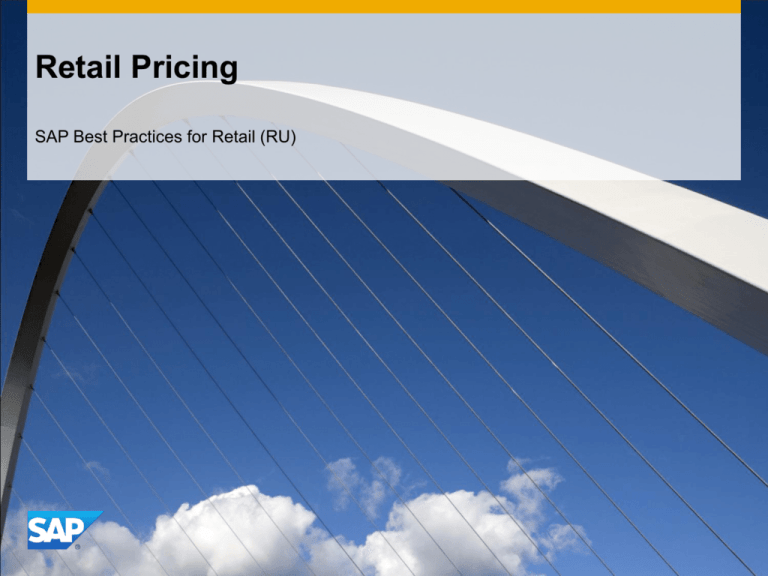
Retail Pricing
SAP Best Practices for Retail (RU)
Purpose, Benefits, and Key Process Steps
Purpose
Retail pricing provides retailers as well as wholesalers with a key opportunity to maintain
prices in a competitive, aggressively-priced environment
Benefits
Boost margins, sales and the success of a company
Test new products on the market
Maintain prices in accordance to the market situation (competitor, price family,
prices at site level, site price list level, price point)
Key Process Steps
Create retail pricing for different articles (single, generic, sales set…)
Create price at different level (site, site price list, distribution chain)
Create prices with price points
Create price family, competitor pricing, market basket calculation, worklist
© 2011 SAP AG. All rights reserved.
2
Required SAP Applications and Company Roles
Required SAP Applications
SAP enhancement package 5 for SAP ERP 6.0
Company Roles
Retail Pricing Manager
Retail Store Manager
Retail Non-Seasonal Purchaser
© 2011 SAP AG. All rights reserved.
3
Process Flow Diagram
Retail Pricing Manager
Execute Retail Pricing
Perform Wholesale Calculation
Basis for the sales
price calculation
Display or change
planned markups
Sales price
calculation – single
article
Basis for the sales
price calculation
Pricing worklist
release
Display or change
planned markups
Generate pricing
worklist
Planned markup
(AUFS) for a
merchandise
category
Change sales price
PB00 for articles
Price list – specific
markup (AUFS) for
a merchandise
category
Create pricing
document
Sales price
calculation –
generic article
Retail Pricing Manager
Sales price
calculation – sales
set
Retail markup for a
merchandise
category
Processing the
pricing worklist
Create sales order
Site price lists
Price calculation
for price family
Calculate sales
prices using
competitor's prices
Calculate with
price points
Maintain a vendor
condition at
purchasing level
Enter competitor's
prices in a price
entry list
Market – basket
calculation
Sales price
calculation –
calculation with
price ist
Individual or list
display for
customer –
specific discount
(K007)
Perform a sales
price calculation
with manual
transfer of the
suggested price
Perform a sales
price calculation
with automatic
transfer of the
suggested price
Customer –
specific markups
and markdowns
Create a customer
– specific discount
(K007)
© 2011 SAP AG. All rights reserved.
4
Trade - Calculation
© 2011 SAP AG. All rights reserved.
5
Pricing
Basics of pricing
Purchase-/sales-pricing
conditions, calculation schemes
Calculation of a single article
Calculation of a generic article
Calculation of a sales set
© 2011 SAP AG. All rights reserved.
6
Pricing
Pricing in wholesale
Pricing with price lists
Customer-specified discount
Calculation inventory processing
© 2011 SAP AG. All rights reserved.
7
Sales Price Calculation: Basics
MM Conditions
Sales price
Margin resp.
actual mark-up
SD Conditions
Sales price
© 2011 SAP AG. All rights reserved.
8
Sales Price Calculation : Basics
One-step calculation
with a recommended retail price
Vendor
Purchase (net/gross)
RUB 10,-
Customer
Consumer
Sale (net)
RUB 19,99
Sale (gross)
RUB 19,99
Mark-up: 30%
Cust. disc.: 5%
Mark-up: 10%
VAT: 16%
Price point group: 001
© 2011 SAP AG. All rights reserved.
9
Sales Price Calculation : Basics
Data retention level
Level, on which gen. conditions (price, mark-ups, discount,
taxes etc.) can be saved.
Distribution chain (Refsite!)
Distribution chain /Price list
Site group
Site
Article
© 2011 SAP AG. All rights reserved.
10
Two-Step Calculation
CoCd: 1000
Planaufschlag:
WG/VL
S.Org.: 1000
Vendor
0,90
10
30
1000/30
1000/10
30
10
DC
1,00
1,10
Store 1
Store 2
1,99
1,99
Consumer
© 2011 SAP AG. All rights reserved.
Consumer
0,90
Customer
1,89
Consumer
11
Price List Calculation
Screw assortment
Material group: MC14401
Price list P1
Mark-up: 10%
Price list P2
Mark-up : 20%
Price list P3
Mark-up : 30%
Sales price 1
Sales price 2
Sales price 3
Cust. disc. X
Freight Costs X2
...
Cust. disc. Y
Freight Costs Y2
...
Cust. disc. Z
Freight Costs Z2
...
End-SP 1
End-SP 2
End-SP 3
© 2011 SAP AG. All rights reserved.
12
Processing of the pricing work list (1)
Screw assortment
Material group: MC14401
Sales price (old):
Sales price (new):
RUB 9,RUB 10,-
Update of direct entry
Is the change in purchase pricerelevant to costing?
Layout of the work list
-> Direct entry -> creation of the worklist
What sales prices resp. calculations
effected?
© 2011 SAP AG. All rights reserved.
13
Processing of the pricing work list(2)
Generate pricing work list
Release of the pricing worklist
(Review of the calculation proposal)
Accept/change/abolish calculations
1000/10/10
SP RUB 29,© 2011 SAP AG. All rights reserved.
1000/30/10
SP RUB 16,-
1000/20/10
SP RUB 24,14
Pricing - Checklist
Sales price calculation
Single article
Sales set/generic article
Price lists
Customer-specified discount
Arrangement of customer-specified discount
Pricing in the sales order
Pricing worklist
Activation of the direct entry for creating the
worklist
Generation of calculation proposals for the
processing and the release
© 2011 SAP AG. All rights reserved.
15
© 2011 SAP AG. All rights reserved
No part of this publication may be reproduced or transmitted in any form or for any purpose
without the express permission of SAP AG. The information contained herein may be
changed without prior notice.
Some software products marketed by SAP AG and its distributors contain proprietary
software components of other software vendors.
Microsoft, Windows, Excel, Outlook, and PowerPoint are registered trademarks of Microsoft
Corporation.
IBM, DB2, DB2 Universal Database, System i, System i5, System p, System p5, System x,
System z, System z10, System z9, z10, z9, iSeries, pSeries, xSeries, zSeries, eServer,
z/VM, z/OS, i5/OS, S/390, OS/390, OS/400, AS/400, S/390 Parallel Enterprise Server,
PowerVM, Power Architecture, POWER6+, POWER6, POWER5+, POWER5, POWER,
OpenPower, PowerPC, BatchPipes, BladeCenter, System Storage, GPFS, HACMP,
RETAIN, DB2 Connect, RACF, Redbooks, OS/2, Parallel Sysplex, MVS/ESA, AIX,
Intelligent Miner, WebSphere, Netfinity, Tivoli and Informix are trademarks or registered
trademarks of IBM Corporation.
Linux is the registered trademark of Linus Torvalds in the U.S. and other countries.
Adobe, the Adobe logo, Acrobat, PostScript, and Reader are either trademarks or
registered trademarks of Adobe Systems Incorporated in the United States and/or other
countries.
Oracle is a registered trademark of Oracle Corporation.
UNIX, X/Open, OSF/1, and Motif are registered trademarks of the Open Group.
Citrix, ICA, Program Neighborhood, MetaFrame, WinFrame, VideoFrame, and MultiWin are
trademarks or registered trademarks of Citrix Systems, Inc.
HTML, XML, XHTML and W3C are trademarks or registered trademarks of W3C®, World
Wide Web Consortium, Massachusetts Institute of Technology.
Java is a registered trademark of Sun Microsystems, Inc.
JavaScript is a registered trademark of Sun Microsystems, Inc., used under license for
technology invented and implemented by Netscape.
Business Objects and the Business Objects logo, BusinessObjects, Crystal Reports, Crystal
Decisions, Web Intelligence, Xcelsius, and other Business Objects products and services
mentioned herein as well as their respective logos are trademarks or registered trademarks
of Business Objects Software Ltd. Business Objects is an SAP company.
Sybase and Adaptive Server, iAnywhere, Sybase 365, SQL Anywhere, and other Sybase
products and services mentioned herein as well as their respective logos are trademarks or
registered trademarks of Sybase, Inc. Sybase is an SAP company.
All other product and service names mentioned are the trademarks of their respective
companies. Data contained in this document serves informational purposes only. National
product specifications may vary.
The information in this document is proprietary to SAP. No part of this document may be
reproduced, copied, or transmitted in any form or for any purpose without the express prior
written permission of SAP AG.
This document is a preliminary version and not subject to your license agreement or any
other agreement with SAP. This document contains only intended strategies, developments,
and functionalities of the SAP® product and is not intended to be binding upon SAP to any
particular course of business, product strategy, and/or development. Please note that this
document is subject to change and may be changed by SAP at any time without notice.
SAP assumes no responsibility for errors or omissions in this document. SAP does not
warrant the accuracy or completeness of the information, text, graphics, links, or other items
contained within this material. This document is provided without a warranty of any kind,
either express or implied, including but not limited to the implied warranties of
merchantability, fitness for a particular purpose, or non-infringement.
SAP shall have no liability for damages of any kind including without limitation direct,
special, indirect, or consequential damages that may result from the use of these materials.
This limitation shall not apply in cases of intent or gross negligence.
The statutory liability for personal injury and defective products is not affected. SAP has no
control over the information that you may access through the use of hot links contained in
these materials and does not endorse your use of third-party Web pages nor provide any
warranty whatsoever relating to third-party Web pages.
SAP, R/3, SAP NetWeaver, Duet, PartnerEdge, ByDesign, SAP BusinessObjects Explorer,
StreamWork, and other SAP products and services mentioned herein as well as their
respective logos are trademarks or registered trademarks of SAP AG in Germany and other
countries.
© 2011 SAP AG. All rights reserved.
16



